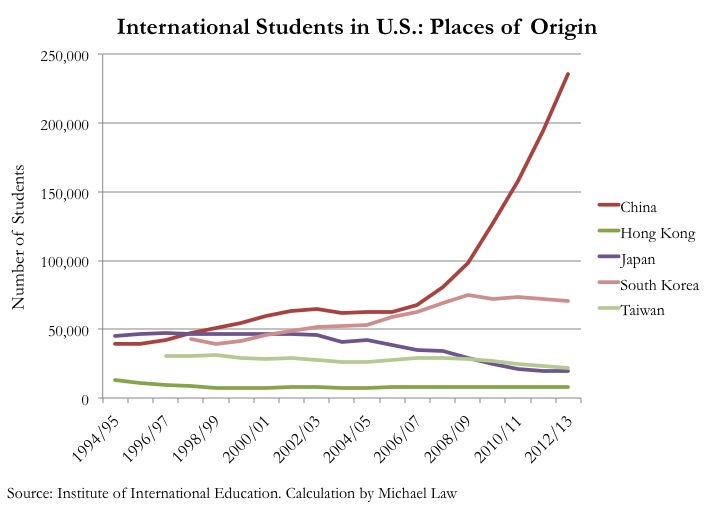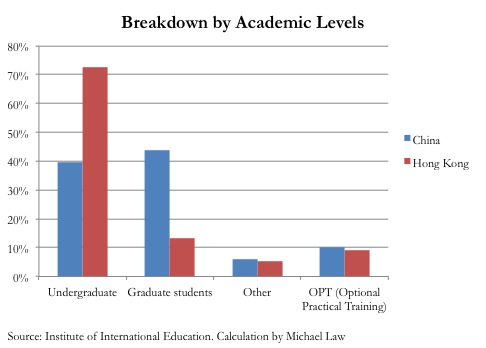The FT has an article featuring overseas Chinese students. According to the article,
The number of Chinese studying overseas has more than tripled in the past decade and continues to shoot up. The rise has been particularly dramatic among lower-middle-class families: according to a report from the Chinese Academy of Social Sciences, up to the end of 2009 students from such families made up only 2 per cent of all those who studied overseas, but by the end of 2010 the proportion had risen to 34 per cent.
…
But is it worth spending Rmb1m-2m ($165,000-$330,00) on preparing for and completing an overseas degree, only to return to a job market where seven million graduates cannot find jobs? … Jennifer Feng, chief human resources expert at 51job, the leading Chinese employment agency, says there is “no big difference between the starting salaries of those holding overseas or local university degrees”. Gone are the days when an overseas degree ensured a top-paying job.
Indeed, the rise in numbers of Chinese students abroad is phenomenal. According to the Institute of International Education, in less than a decade, the number of Chinese studying in the U.S. has quadrupled, from a little over 60,000 in 2004, to almost 240,000 in 2013. This surge in number in a quite recent event — until 2006/07 the increase has been gradual, but after the global financial crisis, the rise has become exponential. China now accounts for almost one in every three international students in the U.S., a historic high for any country.
A simple supply-demand theory would say that when there are more foreign Chinese students, their “value” decreases. But it is premature to say that going abroad to study does not pay off. As a start, my (biased) personal experiences do not support the hard evidence that there are one Chinese in every three international students. At Harvard, although Chinese students represent the largest group of foreigners (at 686 students), my guess is that they represent at most only 10 percent of the foreign (defined as non-U.S.) population.
The equation does not add up if that is the case in all universities, so it must mean that many other schools have (much) higher concentration of Chinese students. These are, presumably, lower-ranked schools. The result is that the average quality of these overseas Chinese students people who have studied overseas – known as “haigui”, or sea turtles — must decrease. If education serves merely as a signal to distinguish out the smart kids, it should not surprise us that going to lower-ranked schools would not help boost your salary. In order words, it does not necessarily mean the premium — in terms of salary — of going abroad is decreasing; it may just mean that an average haigui is less talented than before.
I’m guessing that same logic applies to Hong Kong students too, although the reverse is true. At graduate schools, I see very few Hong Kong students, and this is supported by data: only 13 percent of Hong Kong students in the U.S. are graduate students, whereas it is 44 percent for China. In 2012/13 there are 235,597 and 8,026 students in total from China and Hong Kong respectively, and a back-of-the-envelope calculation gives me 103,427 Chinese and 1,051 Hong Kong graduate students in the U.S. respectively — it is almost a 100 to 1 ratio!
Doing a graduate degree abroad is not a preferable route for most Hong Kong students, as they see the opportunity cost (e.g. forgone salary) of doing so is too high. Therefore, Hong Kong students would likely apply only to the top graduate schools, and/or do degrees that they see a direct pecuniary returns, like an MBA. That probably would bias update the average salary of Hong Kong students abroad? But why didn’t that incentivize more Hong Kong student to pursue graduate studies abroad? That I have no simple answer for now. But it is notable that Japanese students in the U.S. has almost halved in the past 15 years, when Japan has become a more inward-looking economy. It does not seem to be a coincidence that when a country assumes a more prominent role in the global economy, the number of students studying abroad also increases too. Hong Kong sees the number of its students to the U.S. dropping in the past 15 years, too, albeit at a lower rate. Alas, this may be a warning to Hong Kong.


Post a Comment